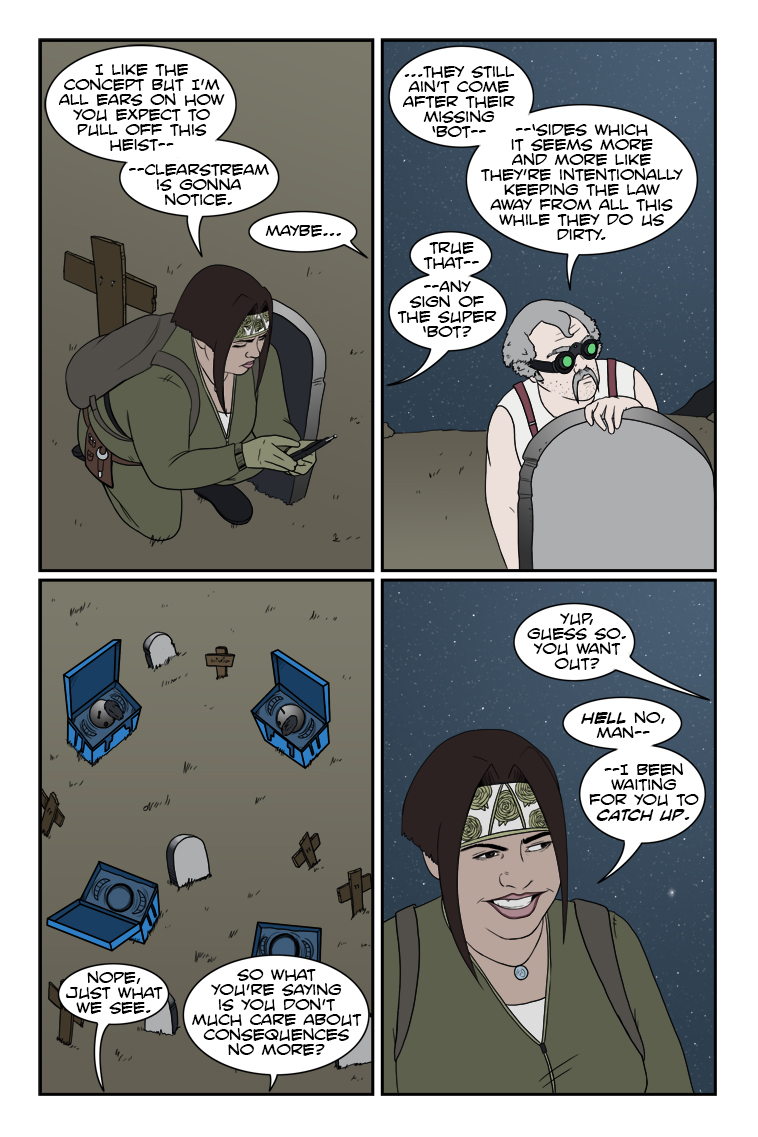Cart
Product categories
Support Us!
If you like what I do please support us on Ko-fi or Patreon.
Follow Us!
Join Our Newsletter!
Vote For Us!
Login
Polls
Events
-
Pasadena Comic Con
Dates: May 24
Location: Pasadena Convention Center, 300 E Green St, Pasadena, CA 91101, USA ( MAP)Details:We will be at the Pasadena Comic Con on January 26th. See some of you there for this one day event!
Purchase tickets online at here: https://www.tixr.com/groups/pcc/events/pasadenacomiccon-pasadena-comic-con-2025-115248
-
San Diego Comic Con: SP-N7
Dates: Jul 23 - 27
Location: San Diego Convention Center, 111 Harbor Dr, San Diego, CA 92101, USA ( MAP)Details:Clint & Dawn Wolf will be at San Diego Comic Con, as Lab Reject Studios. We will be at booth N7 in Small Press.









6 thoughts on “542 – Catching Up”
Keith
Some friction, but yeah. IRL, I’d like these two…they should have kids. 😉
Dawn
I might have to draw out what their kid would look like. First thought is that their kid would look like Ongo Gablogian from “It’s Always Sunny In Philadelphia”
Scarsdale
He’s pushing 60, she’s maybe 30, more likely less. Chuck is most likely shooting blanks, and besides, he’s talking to her like a baby sister than a love interest.
ConcordBob
It is really hard to have a favorite character, as there are so many good ones. But I think Rosa is my favorite. Chuck is a good accomplice in sneaking work, but not much for romance. Uugh.
Otaku
I mean, if they don’t have at least an inkling of what’s going down, I’m actually disappointed in Clearstream. If anything, I’m starting to wonder if they caught on and realized “Wait, we can use this.”
Because of course they can. 😉
Dr. Norman (not a real doctor)
I’m way ahead of you – I’ve been waiting for you to catch up. From November 2020:
I would hope for nothing less – her and Chuck have the potential for a great deal of positive mischief.
Speaking of which, I received the email notifying me that my order for the NSFW “Chuck and Rosa Finally Do It” (age verification required) limited edition hardcover is going to be delayed due to the pandemic. I think it’s really cool that you’ll be adding some additional stretch goal goodies when it ships – thanks for all your story and art.
As for the inscription, ” We owe it all to you ” will be sufficient.
Latest Comics
#84. 80 – Pointless Points
18 Jun 22, 2011
#83. 79 – Cold Comfort
24 Jun 15, 2011
#82. 78 – Idealized Conditions
21 Jun 08, 2011
#81. 77- Too Much Of A Good Thing
49 Jun 01, 2011
#80. 76 – Beware Of False Profits
49 May 25, 2011
#79. EPISODE FOUR
52 May 23, 2011
#78. 75 – Dead Man’s Hand (END OF EPISODE 3)
49 May 11, 2011
#77. 74 – The Matchmaker
51 May 04, 2011
#76. 73 – Signal To Noise
26 Apr 27, 2011
#75. 72 – Dinner Is Served
25 Apr 20, 2011
#74. 71 – Endangered Specie
26 Apr 13, 2011
#73. 70 – Loose Talk
28 Mar 30, 2011
#72. 69 – Picture Perfect
34 Mar 23, 2011
#71. 68 – Z Is For Zane
34 Mar 16, 2011
#70. 67 – Where’s The Beef?
36 Mar 09, 2011
#69. 66 – Talking Crap
36 Mar 02, 2011
#68. 65 – Medicinal Purposes
31 Feb 23, 2011
#67. 64 – Rancher’s Intuition
38 Feb 16, 2011
#66. 63 – Trust Issues
46 Feb 09, 2011
#65. 62 – Home on the Range
39 Feb 02, 2011
Latest Chapters
Episode 22
Episode 21
Episode 20
Episode 19
Episode 18
Episode 17
542 – Catching Up
Now you're getting the idea, Chuck!
POV
Calendar
BlueSky Latest Posts
Writer’s Blog Archives